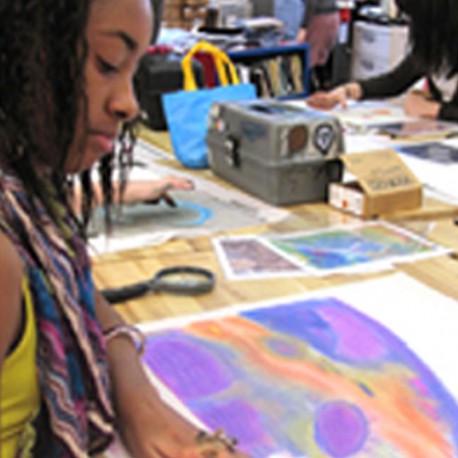 View larger
View larger
Art and the Cosmic Connection
New activity
Using NASA imagery, participants use images as inspiration for artwork while learning about geology of planetary bodies and moons
Open Activity
How-to Video
-
Rating
-
Participants Enjoyed the ActivityParticipants Learned from This ActivityActivity Instructions Were Clear and Easy to FollowWould Recommend
Related Programming Resources
| Related Links |
Overview Video
Eurekus Art Techniques Solar System Edition PowerPoint Presentation Earth Edition: Goldilocks Planet Project Solar System Kids Astronomy Spray Paint of Space Out Of This World: How Artists Imagine Planets Yet Unseen |
| Originating Source | Created by Monica & Tyler Aiello, Artists & Educators for NASA’s Discovery and New Frontiers Programs |
| Related Books [Suggest a book] |
Voyager’s Greatest Hits: The Epic Trek to Interstellar Space by Alexandra Siy
If You Were the Moon by Laura Purdie Salas and Jaime Kim 2018 Young Explorer's Adventure Guide by Bruce Golden, Nancy Kress, Stephen Blake, Sherry D Ramsey and Dawn Vogel My tourist guide to the solar system and beyond by Lewis Dartnell Science Adventures with Max the Dog by Jeffrey O Bennett and Alan Okamoto |
Reviews
"Ages 8 to 108"
I've done this as a library program a few times. Things that I like to do are 1) reduce the number of slides. Pick slides that cover more than one element, like shape AND color. 2) I tell them that I expect the "talking" part to last 15 minutes and then we will spend the rest of the time on art. I invite families with younger children to join us for the art part. I try really hard to not go over on the talking, even if it means skipping some of the elements. 3) I have teen volunteers act as "plants" in the audience. I tell them to ask questions and participate when it seems like the rest of the audience is being shy. I might even give them sample questions. I do this for other programs, too, and it usually helps give the real audience confidence to speak up. 4) On my press releases, I will put "for ages 8-108" since anyone younger tends to have a hard time sitting through the slides for too long.
I'm not really an artsy person, and I feel like the presentations could be improved with more art instruction (how to blend, etc.) incorporated into the slides.
Very easy and engaging activity
Art and the Cosmic Connection adapts easily into an all ages event. I had about 16 people in my group, ranging in age from 3 years old through adult. I have no art experience, so I was a little nervous when planning this activity, but the instructions are very thorough.
I made use of the PowerPoint display included in the resource. I allotted only 60 minutes for the program, so I gently edited the PowerPoint, deleting just a few slides from each category. I purchased chalk pastels in bulk online and used paper I found in my craft closet, so the total cost for this event was about $24.00 for 16 people.
The paper I had on hand was 12” x 18”. I cut several sheets into quarters for so participants could use a smaller sheet of paper to practice their chalk pastel technique while we viewed the PowerPoint slides. The notes on the slides are great and had more information than we could absorb, but the slides gave an overview of types of celestial bodies that would inspire our art, as well as five basic elements of art that we could use to guide us as we created our masterpieces. I spent about 25 minutes on the slides, then handed out the larger pieces of paper, as well as color copies of some of the NASA images, and everyone got to work. All ages were engaged and created really wonderful drawings! I let them draw for about 25 minutes, then announced it would soon be time to clean up.
The only downside of this activity was the clean up. Chalk pastels are very dusty and smudgy and it took a long time to get the dust off of everything. I would recommend covering the tables with paper, but the dust was on the chairs and floor as well.
Art and the Cosmic Connection
I loved the presentation and the accompanying script was very helpful , the images were high quality, beautiful. The only problem that I had was that the program was more difficult to adapt to a one-hour, one-time library program than I expected it to be. There were so many informative slides that it was hard to decide what to eliminate and when I gave the presentation with at least half edited out, my audience still grew restless and we did not get to draw until near the end. If anyone else had tried this as a one hour program for mixed informal learners (adults and children), I would like to know what they did to adapt it successfully. Otherwise I absolutely love this lesson and want to try it again.



